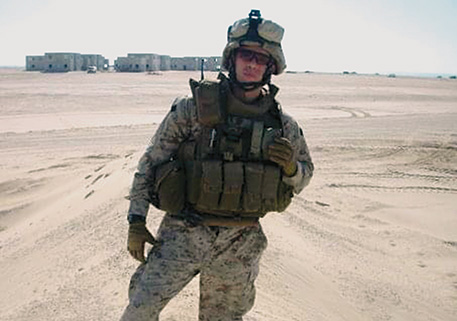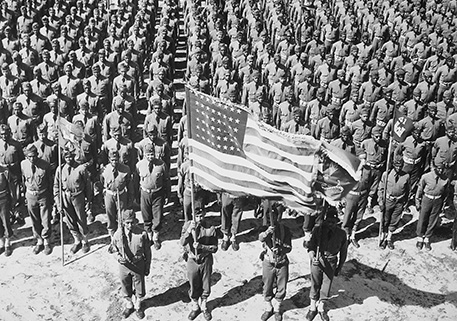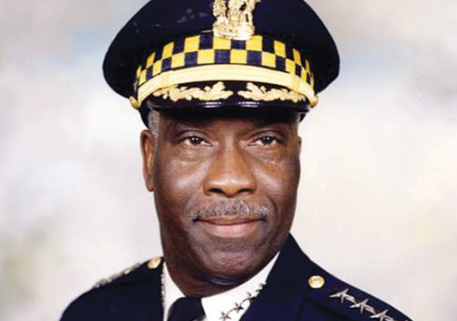Since the conclusion of World War II, Edward Hines Jr. VA Hospital has been improving the quality of life for visually impaired veterans
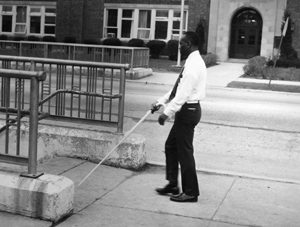
Having lost sight in his right eye in 2000, Vietnam veteran Dan Westberg was devastated when—seven years later—he began to lose vision in his left eye as well. His failing sight cost him his job, his ability to drive and his sense of independence.
But at the encouragement of a Veterans Affairs Visual Impairment Services Team coordinator, Westberg hesitantly sought assistance at the Edward Hines Jr. VA Hospital Central Blind Rehabilitation Center—the first of 13 specialty residential inpatient training programs across the country to help veterans adjust to vision impairment. In 2018, the center is celebrating 70 years of serving veterans.
“At first, I expected coming here would be like going to a nursing home. … I was down in the dumps,” explained Westberg. “But this is so far from that. They showed me never give up—you can still do so much and have fun.”
The VA estimates that roughly 157,000 legally blind veterans live in the U.S.—and there are more than a million veterans whose low vision impacts their ability to perform daily tasks, including a large percentage who have sustained traumatic brain injuries.
The goal of the blind rehabilitation centers is to “help each veteran become as independent as possible in all aspects of daily life.” That is a mission Anthony Cleveland, a supervisor at the Hines center, lives day in and out.
The grandson of a Korean War veteran, Cleveland began to learn tasks to help around the house after his grandfather’s vision began to fail due to glaucoma. The experience inspired Cleveland to take an elective class in college that focused on serving disabled veterans in the VA. The death of his grandfather moved him to turn that class into a career, and for 14 years he has served veterans—a population near and dear to his heart.
“You work on the same programs, but each veteran’s experience makes it different. Forming those relationships has been the most rewarding,” Cleveland said.
Veterans come to blind rehabilitation centers for training in orientation and mobility, accessing technology and communications as well as visual, manual and living skills. The majority of training is one on one, with some group sessions.
Veterans typically come to the center for six to eight weeks and revisit every several years as relevant vision technology modernizes or as their situation changes, such as experiencing a decrease in vision or a loss of a family caregiver.
Incorporating vision rehabilitation with other disability or mental health treatment is another component of care, and the center has psychologists and social workers on site trained to assist veterans who are adjusting to vision loss.
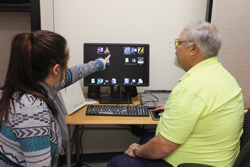

Cleveland explained that, just like at the onset of other disabilities, many veterans first focus on what they believe they cannot do. Sports usually rank high on that list, but through adaptation and rehabilitation training, veterans can master an activity like they could prior to vision loss.
“The patients feel empowered,” said Cleveland, who additionally supports the National Disabled Veterans TEE (Training, Experience and Exposure) Tournament. “It serves as a good opportunity for veterans to use all of the skills they learn here in a safe environment.”
The center sends a large team of veterans annually to the tournament, which began 25 years ago as a local program for blind patients at the Iowa City VA Medical Center. The event—now co-hosted by DAV and the VA—has since expanded to include more veterans nationwide. Hundreds gather in Iowa each autumn to develop new skills and strengthen self-esteem through adaptive golf and rehabilitative activities, including bowling, horseback riding and kayaking.
“The TEE Tournament illustrates that, regardless of illness or injury, the only limits disabled or visually impaired veterans have are the ones we place on ourselves,” said Past National Commander Dave Riley, a quadruple amputee and two-time tournament participant. “The VA blind rehabilitation centers provide my brothers- and sisters-in-arms the resources and confidence required to continue being independent and break down barriers facing visually impaired veterans.”
Thanks to his training at the clinic, along with his experiences at the TEE Tournament, Westberg learned that his visual impairments were not a limitation, but rather an opportunity to challenge himself.
“I never golfed before I lost my vision, and now I have gone to the Golden Age Games and I have won the TEE Tournament,” said Westberg. “I get chills just thinking about it. They get us motivated to get off our behind and do anything we want—and do it well.”
After gaining confidence in his abilities following vision loss, Westberg also realized he did not have to give up restoring classic cars, a passion he has held for more than four decades. He has now restored 30 vehicles, including three that were completed post-vision loss.
The Iowa resident returned to the center for several weeks of additional living skills and technology training in January, following the death of his wife. The center staff worked to ensure he has the tools and resources at home to continue living independently. For his part, Westberg said he would recommend the center to any veteran struggling with vision loss.
“I know I’ll lose my sight someday, and I want to be ready for it,” said Westberg. “They keep helping me, and I keep coming back.”
Learn More
Any eligible veteran or active-duty service member who is legally blind or has severe vision loss may receive training at any of the 13 VA blind rehabilitation centers. Service connection is not a requirement. To learn more, visit rehab.va.gov/blindrehab or call 202-461-7317

